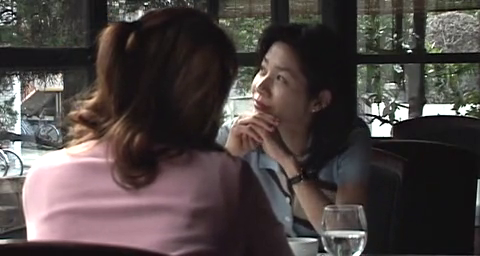a letter from Hiroshima
you could watch the short here
https://www.youtube.com/watch?v=VLwjtsIY3hs&t=1241s

https://www.youtube.com/watch?v=VLwjtsIY3hs&t=1241s
TAKEN FROM HERE
[https://www.tumblr.com/search/a%20letter%20from%20hiroshima]
Suwa once said, “The tragedy can be seen and understood only through foreign eyes.”. He then explains this is what fascinated him of Hiroshima Mon Amourthat it was filmed by French director and acted both by Japanese and French actor/actress. He also said “Japanese people can’t see or talk about this city. It’s both too intimate and too immense.” That perhaps is why Suwa or Robert’s father who both directly experienced the event said almost nothing about it, as it is narrated in A Letter from Hiroshima. It seems that’s why he invites Hojung, a Korean woman to Hiroshima to work with him but just lets her explore the city. But then, Faji, a Korean National in Japan, also discusses the event and shares her feelings with Hojung which according to me, suggests what he means by ‘foreign’ could be anyone who weren’t directly involved in the event at the time, including Suwa and those actors in H Story.

As mentioned, Japanese feel the event is too intimate and too immense to talk about. And also according to Arnaud Duquesne, “To deal with Hiroshima, the Japanese must ask questions about the war and its origins, and thus about the Japanese roots of the conflict.” This, however, is done by Suwa in A Letter from Hiroshima. In the film, Hojung writes to Suwa, talking about the ‘ironic circumstance’ that the bombing at Hiroshima lets Koreans be independent from Japanese colonization. So Suwa not only remembers Hiroshima event as where Japanese alone were victimized, but also does not forget to bring up what Japan did to other country.
It seems Hiroshima has not been talked much both by those who directly experienced the event and also among film directors. However, now, it looks like the memory of the event already kind of started to fade away by the generation with no such experience, even before the issue gets revealed to be discussed properly. In H Story, Beatrice talks how school kids in peace museum were laughing and even Suwa himself confesses he hasn’t given much thought about what happened in Hiroshima, his own hometown, until he watched Hir oshima Mon Amour. In A Letter from Hiroshima, Faji says, “But young people have grown accustomed to seeing the Peace Memorial and other buildings that were bombed.” Probably, Suwa wanted to dig up the event once more, get shed a light on it, and let us think at least something about the memory, even though it is only a collective memory for us.
Especially, A Letter fom Hiroshima tries to pay attention to the young generation, what and how do they think about the event now.(Even H Story has quite a number of scenes reflecting young culture on the street.) They not only need to know about the event, but also need to attempt to understand it and have their own opinions about it. It could be like Faji, who at least feel guilty when she could not be as vocal as those elder citizens about bomb testing in other countries. I feel like this is because those young people will be making the future world.
Finally, t is interesting to note how Hojung keeps trying to connect the event to her life, by thinking how would it be like if she was Japanese, or how would her grandparents have had to suffer under Japanese colonization and wars. This is what we do when we attempt to understand something truly: to put ourselves in their shoes and try to make the closest connection to ourselves. Probably this is what Suwa wanted us to do by his works. Even though Suwa said he cannot represent the issue, he can’t let us feel what those having lived 40 years ago, he made his best effort to render us reflect the event.


Comments
Post a Comment